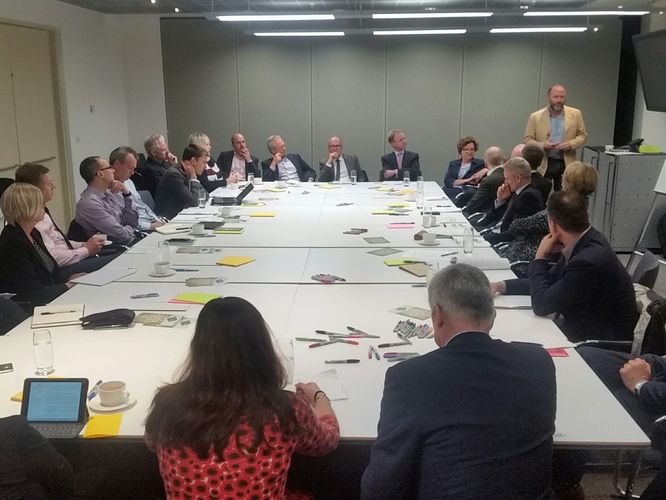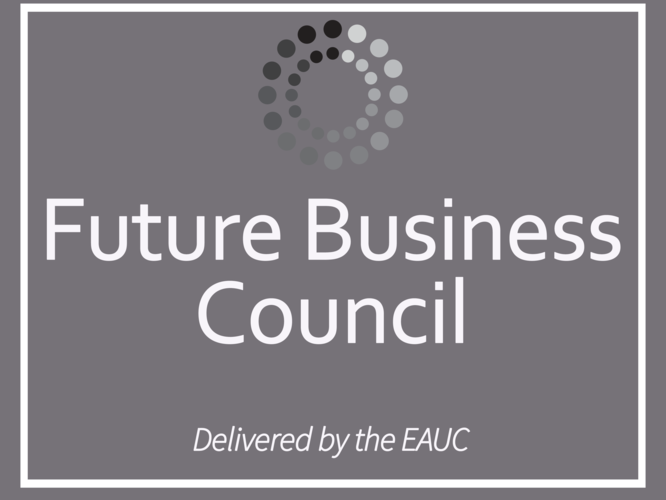Executives from leading businesses and universities met for the first time la...
Executives from leading businesses and universities met for the first time last week (Thursday, 18 May) to tackle the worsening issue of the graduate skills gap.
The inaugural meeting of the EAUC Future Business Council saw 34 attendees from universities and global companies come together to discuss solutions to the burgeoning issue. Attendees of the event included Marks and Spencer, HSBC, Prudential, Unilever, PwC, National Grid, BP, SSE & Universities of Glasgow, Cork, Harvard, Southampton, Manchester and Nottingham Trent to name a few.
An understanding of sustainable development was identified as one of the biggest skills missing from the average graduate. Often associated with only environmental practices, sustainable development is actually an incredibly broad term that is generally accepted to mean ‘development that meets the needs of the present without compromising the ability of future generations to meet their own needs’. To give focus to the concept, sustainable development works to balance three priorities: economic, social and environmental concerns.
It is an integral skill for most graduate positions at global companies and education is widely accepted as key to bringing about this ability to balance, with tertiary education playing a particularly strong role. The EAUC Future Business Council aims to bridge the skills gap at its roots by suggesting practical action to ensure students of all disciplines understand the need for balance and can use this understanding to handle complex problems with interdisciplinary perspectives.
After much debate, the employer-focused platform agreed on several potential actions:
• Influencing and linking leaders i.e. Chief Executives and Vice Chancellors
• Better linkage between business executives and university governing councils
• An employer/graduate capability matrix for employable graduates
• Business models to drive university-industry innovation
Iain Patton, Chief Executive of the Environmental Association for Universities and Colleges (EAUC), said: “For the EAUC, the need for a new dialogue and relationship between leaders in business and industry and universities and colleges is clear. Our new Council brings employers and educators together to ensure that graduates are ready for the significant challenges of tomorrow's workplace. I’m incredibly pleased with how the first meeting has gone. Some of the best minds from education and business are now working together to ensure we are creating a future fit generation to lead the world into a new sustainable era.”
Mike Barry, Director of Plan A at Marks and Spencer, said: “We must create a society, and economy that serves it, that works for all. That means radical changes to how we run business. This will require a new cohort of leaders and a wealth of sustainable innovation to spring from the higher education sector. We believe that EAUC Future Business Council (FBC) can align the considerable hard work being done in individual higher education establishments and companies to ensure that our activity is ‘more than the sum of its parts’ and we can together accelerate the shift to a sustainable future.”
Professor Janet Haddock-Fraser, Chair in Sustainability and Leadership at Manchester Metropolitan University’s Faculty of Business and Law, said: "As leaders and educators of today, we have a responsibility to ensure our future leaders, educators and consumers understand the interplay of society, economy and environment to ensure sustainable futures for all. Creating the EAUC Future Business Council (FBC) has brought together businesses and universities to work in an action-orientated collaboration to seek solutions to enable this. There is substantial good practice and exciting innovation in individual universities and businesses which are great building blocks towards sustainability. The EAUC FBC will be the cement that holds them together."
ENDS
Notes to Editor
‘Development that meets the needs of the present without compromising the ability of future generations to meet their own needs’ – World Commission on Environment and Development, 1987.
About EAUC
The EAUC represents institutions with over 2 million students and nearly 400,000 staff with a spending budget of over £25 billion. We exist to lead and empower the post-16 education sector to make sustainability 'just good business'. For more information, visit www.eauc.org.uk or follow us on Twitter @TheEAUC
Media Contact
Media and Campaigns Officer - Rosie Saban – rsaban@eauc.org.uk - 01242 714321
The inaugural meeting of the EAUC Future Business Council saw 34 attendees from universities and global companies come together to discuss solutions to the burgeoning issue. Attendees of the event included Marks and Spencer, HSBC, Prudential, Unilever, PwC, National Grid, BP, SSE & Universities of Glasgow, Cork, Harvard, Southampton, Manchester and Nottingham Trent to name a few.
An understanding of sustainable development was identified as one of the biggest skills missing from the average graduate. Often associated with only environmental practices, sustainable development is actually an incredibly broad term that is generally accepted to mean ‘development that meets the needs of the present without compromising the ability of future generations to meet their own needs’. To give focus to the concept, sustainable development works to balance three priorities: economic, social and environmental concerns.
It is an integral skill for most graduate positions at global companies and education is widely accepted as key to bringing about this ability to balance, with tertiary education playing a particularly strong role. The EAUC Future Business Council aims to bridge the skills gap at its roots by suggesting practical action to ensure students of all disciplines understand the need for balance and can use this understanding to handle complex problems with interdisciplinary perspectives.
After much debate, the employer-focused platform agreed on several potential actions:
• Influencing and linking leaders i.e. Chief Executives and Vice Chancellors
• Better linkage between business executives and university governing councils
• An employer/graduate capability matrix for employable graduates
• Business models to drive university-industry innovation
Iain Patton, Chief Executive of the Environmental Association for Universities and Colleges (EAUC), said: “For the EAUC, the need for a new dialogue and relationship between leaders in business and industry and universities and colleges is clear. Our new Council brings employers and educators together to ensure that graduates are ready for the significant challenges of tomorrow's workplace. I’m incredibly pleased with how the first meeting has gone. Some of the best minds from education and business are now working together to ensure we are creating a future fit generation to lead the world into a new sustainable era.”
Mike Barry, Director of Plan A at Marks and Spencer, said: “We must create a society, and economy that serves it, that works for all. That means radical changes to how we run business. This will require a new cohort of leaders and a wealth of sustainable innovation to spring from the higher education sector. We believe that EAUC Future Business Council (FBC) can align the considerable hard work being done in individual higher education establishments and companies to ensure that our activity is ‘more than the sum of its parts’ and we can together accelerate the shift to a sustainable future.”
Professor Janet Haddock-Fraser, Chair in Sustainability and Leadership at Manchester Metropolitan University’s Faculty of Business and Law, said: "As leaders and educators of today, we have a responsibility to ensure our future leaders, educators and consumers understand the interplay of society, economy and environment to ensure sustainable futures for all. Creating the EAUC Future Business Council (FBC) has brought together businesses and universities to work in an action-orientated collaboration to seek solutions to enable this. There is substantial good practice and exciting innovation in individual universities and businesses which are great building blocks towards sustainability. The EAUC FBC will be the cement that holds them together."
ENDS
Notes to Editor
‘Development that meets the needs of the present without compromising the ability of future generations to meet their own needs’ – World Commission on Environment and Development, 1987.
About EAUC
The EAUC represents institutions with over 2 million students and nearly 400,000 staff with a spending budget of over £25 billion. We exist to lead and empower the post-16 education sector to make sustainability 'just good business'. For more information, visit www.eauc.org.uk or follow us on Twitter @TheEAUC
Media Contact
Media and Campaigns Officer - Rosie Saban – rsaban@eauc.org.uk - 01242 714321












